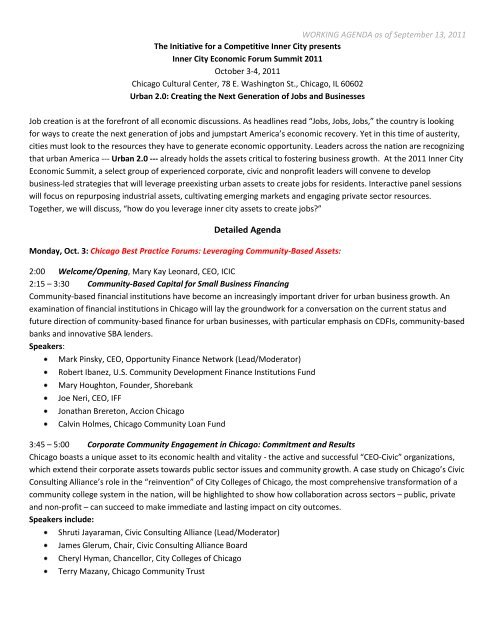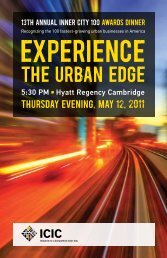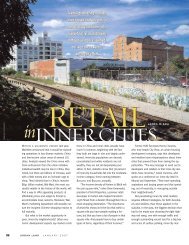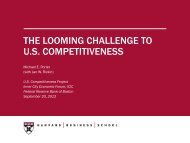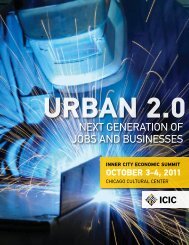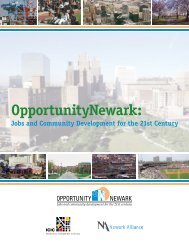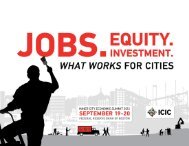Detailed Agenda - Initiative for a Competitive Inner City
Detailed Agenda - Initiative for a Competitive Inner City
Detailed Agenda - Initiative for a Competitive Inner City
Create successful ePaper yourself
Turn your PDF publications into a flip-book with our unique Google optimized e-Paper software.
WORKING AGENDA as of September 13, 2011The <strong>Initiative</strong> <strong>for</strong> a <strong>Competitive</strong> <strong>Inner</strong> <strong>City</strong> presents<strong>Inner</strong> <strong>City</strong> Economic Forum Summit 2011October 3-4, 2011Chicago Cultural Center, 78 E. Washington St., Chicago, IL 60602Urban 2.0: Creating the Next Generation of Jobs and BusinessesJob creation is at the <strong>for</strong>efront of all economic discussions. As headlines read “Jobs, Jobs, Jobs,” the country is looking<strong>for</strong> ways to create the next generation of jobs and jumpstart America’s economic recovery. Yet in this time of austerity,cities must look to the resources they have to generate economic opportunity. Leaders across the nation are recognizingthat urban America --- Urban 2.0 --- already holds the assets critical to fostering business growth. At the 2011 <strong>Inner</strong> <strong>City</strong>Economic Summit, a select group of experienced corporate, civic and nonprofit leaders will convene to developbusiness-led strategies that will leverage preexisting urban assets to create jobs <strong>for</strong> residents. Interactive panel sessionswill focus on repurposing industrial assets, cultivating emerging markets and engaging private sector resources.Together, we will discuss, “how do you leverage inner city assets to create jobs?”<strong>Detailed</strong> <strong>Agenda</strong>Monday, Oct. 3: Chicago Best Practice Forums: Leveraging Community-Based Assets:2:00 Welcome/Opening, Mary Kay Leonard, CEO, ICIC2:15 – 3:30 Community-Based Capital <strong>for</strong> Small Business FinancingCommunity-based financial institutions have become an increasingly important driver <strong>for</strong> urban business growth. Anexamination of financial institutions in Chicago will lay the groundwork <strong>for</strong> a conversation on the current status andfuture direction of community-based finance <strong>for</strong> urban businesses, with particular emphasis on CDFIs, community-basedbanks and innovative SBA lenders.Speakers:Mark Pinsky, CEO, Opportunity Finance Network (Lead/Moderator)Robert Ibanez, U.S. Community Development Finance Institutions FundMary Houghton, Founder, ShorebankJoe Neri, CEO, IFFJonathan Brereton, Accion ChicagoCalvin Holmes, Chicago Community Loan Fund3:45 – 5:00 Corporate Community Engagement in Chicago: Commitment and ResultsChicago boasts a unique asset to its economic health and vitality - the active and successful “CEO-Civic” organizations,which extend their corporate assets towards public sector issues and community growth. A case study on Chicago’s CivicConsulting Alliance’s role in the “reinvention” of <strong>City</strong> Colleges of Chicago, the most comprehensive trans<strong>for</strong>mation of acommunity college system in the nation, will be highlighted to show how collaboration across sectors – public, privateand non-profit – can succeed to make immediate and lasting impact on city outcomes.Speakers include:Shruti Jayaraman, Civic Consulting Alliance (Lead/Moderator)James Glerum, Chair, Civic Consulting Alliance BoardCheryl Hyman, Chancellor, <strong>City</strong> Colleges of ChicagoTerry Mazany, Chicago Community Trust
WORKING AGENDA as of September 13, 2011Monday, Oct. 3 continued5:30-8:00pm Reception <strong>for</strong> Urban Leaders (Rotunda, Chicago Cultural Center)Innovation. Inspiration. Job creation. Economic revitalization. Urban wealth generation.Join ICIC, speakers, participants and Chicago leaders as we welcome attendees to Chicago and kickoff the Summit event.Meet, mingle and network be<strong>for</strong>e we tackle the agenda the following day. Featuring the presentation of the 2011Mayoral <strong>Inner</strong> <strong>City</strong> Leadership award to Cincinnati Mayor Mark Mallory <strong>for</strong> his visionary thinking and passionatecommitment to inner city economic revitalizationSpeakers:Michael E. Porter, Founder and Chair, ICIC; Harvard Business SchoolMayor Mark Mallory, <strong>City</strong> of CincinnatiMayor Rahm Emanuel, <strong>City</strong> of Chicago (invited)Tuesday, Oct. 4 “Leveraging Urban Assets: Strategies <strong>for</strong> Economic Growth and Equity”8:00 Registration/Breakfast8:30 Welcome and Introduction(s)8:40 – 10:00 Keynote remarks featuring: Michael E. Porter, Founder and Chair, ICICBuilding Jobs by the Cluster: Using Cluster-Based Economic Development to Revitalize Urban EconomiesIndustry clusters – interconnected firms, suppliers and service companies in a concentrated geographical area – driveeconomic activity and promote innovation. Cluster theory is a potent tool <strong>for</strong> economic development, particularly <strong>for</strong>the U.S.’s urban areas. During this presentation, Dr. Michael Porter will present new ICIC research on cluster-basedapproaches to job creation in inner cities. Promising growth opportunities in industrial and local business-to-businessclusters will be highlighted along with a discussion about positioning industrial assets <strong>for</strong> job creation. The presentationwill conclude with a look at the equity implications of cluster-based approaches.10:00 – 12:45pm Industrial 2.0: Rethink, Repurpose, RetrainLessons from Industrial Cities. Historically industrial cities are adapting their assets to uncover growth opportunities.Leaders from different cities with strong industrial assets will come together <strong>for</strong> an active discussion to solicit bestpractice examples and recommended actions <strong>for</strong> how to position industrial cities <strong>for</strong> growth. <strong>Initiative</strong>s that leveragework<strong>for</strong>ce skills, land and industrial real estate, and innovative capacity will be emphasized.Speakers:Toni Griffin, Harvard Graduate School of Design (Lead/Moderator)Flint, MI: Steve Montle, Flint Mayor’s OfficeChicago: Dan Swinney, Chicago Manufacturing Renaissance CouncilNewark, NJ: Lyneir Richardson, Newark Brick <strong>City</strong> Development CorpPhiladelphia: Scott Page, Interface StudiosFt. Wayne, IN: John Staf<strong>for</strong>d, Indiana University–Purdue University Fort WaynePlenary Address: Roland Martel, Executive Vice President, Illinois Tool WorksA prime example of how shared value approaches can benefit business and community outcomes, manufacturer IllinoisTool Works has been based in the Chicago area <strong>for</strong> almost 100 years, producing goods <strong>for</strong> the transportation,construction, packaging, electronics and food industries. ITW has shown a continued commitment to community, and asuccessful emphasis on connecting working training to available jobs.
WORKING AGENDA as of September 13, 2011Case Study: Developing an Industrial Strategy <strong>for</strong> DetroitHow can industrial-focused cities leverage their assets—industrial land, firm capabilities, work<strong>for</strong>ce skills—<strong>for</strong> economicgrowth? A case study on how Detroit is repositioning existing industrial assets to spur economic growth will be used asthe basis of an interactive session exploring how these lessons can be applied to relevant issues facing urban leaders inboth large and small industrial cities.Facilitator: Jeremiah Boyle, Federal Reserve Bank of ChicagoLead: Olga Stella, Detroit Economic Growth CorporationChicago Perspective (Discussant): Andy Mooney, Chicago Dept of Housing & Economic Development (invited)1:00pm-2:00pm Networking Lunch and Keynote AddressKeynote Address: Kristin Groos Richmond, co-founder and Chief Executive Officer, Revolution FoodsBased on Oakland, Cali<strong>for</strong>nia, Revolution Foods is a fast-growing company that is focused on getting healthy foods tokids. They partner with Whole Foods and urban school districts to deliver delicious and healthy meals to children in citiesacross the U.S.2:15-3:30 Food 2.0: Cultivate and Nourish a Growing IndustryFood Cluster in Urban Economies. Local food systems – the locally-based ecosystem of consumers, firms andinfrastructure that support the production, distribution and consumption of food – can contribute to overall economichealth. As local food clusters evolve to respond to the changing consumer and institutional demands <strong>for</strong> healthy food,new opportunities <strong>for</strong> employment and entrepreneurship will be created. What are the opportunities <strong>for</strong> differenttypes of cities? How do we leverage trends to create jobs and entrepreneurship in low-income communities? We willpreview food cluster strategies being developed <strong>for</strong> two U.S. cities, Boston and Detroit.Introduction: Teresa Lynch, ICICLead: Jon Aram, NextStreet Financial & Karen Karp, Karp Consulting3:30-4:30 Town Hall Forum: Targeting Distressed Economic Areas in the Age of RegionalismRegional growth can benefit inner city neighborhoods. However, regional growth is not always sufficient to “lift allboats” <strong>for</strong> inner city workers. Experts in urban and regional economic and work<strong>for</strong>ce development will discuss themerits and drawbacks of focusing economic development ef<strong>for</strong>ts on a region as a whole, versus targeting on distressedareas. Issues of equity will be of particular importance.Speakers:Diane Bell McKoy, Associated Black Charities (Lead/Moderator)Teresa Lynch, ICICBob Weissbourd, RW VenturesDeputy Mayor Stefan Pryor, <strong>City</strong> of Newark (invited)Jack Litzenberg, Mott FoundationLavea Brachman, Greater Ohio Policy Center


